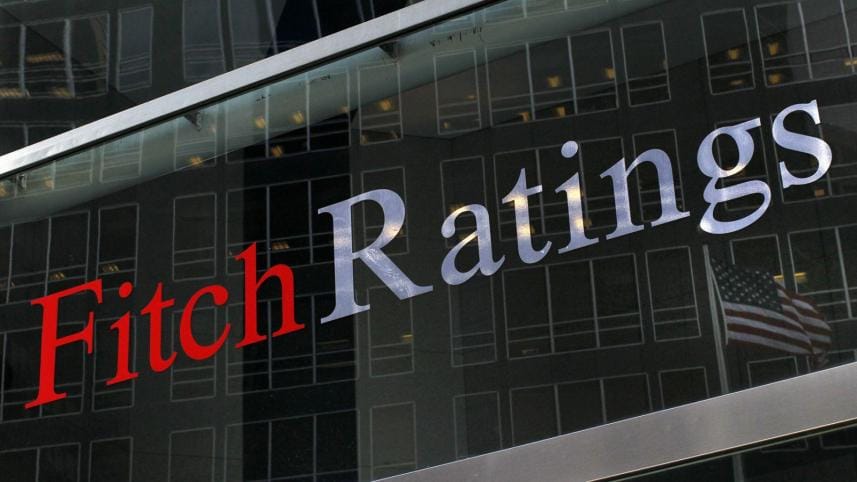Now Fitch has a negative outlook on Bangladesh

Bangladesh's credit rating came under further threat today as Fitch put the country on a "negative" outlook while giving a damning verdict on the central bank's policy response to the fast-depleting foreign currency reserves.
The American rating agency maintained Bangladesh's BB- rating but warned that the outlook was now negative rather than stable, mirroring the action taken in July by its peer Standard and Poor's.
By the end of 2023, Fitch estimates the foreign currency reserves will be sufficient to meet three months' import bill, which is lower than the 'BB' median of 4.4 months. And in the next fiscal year, the import cover will come down to about 2.6 months.
Fitch estimates that gross reserves fell by 19 percent in the first nine months of the year.
As of September 20, foreign currency reserves stand at about $21.5 billion, enough to meet four months' import bill at best, as per the latest published data by the Bangladesh Bank.
"We forecast foreign exchange reserves to stay under pressure, driven by rising imports and foreign currency intervention by the central bank," Fitch said.
The negative outlook reflects a deterioration in external buffers, which has increased vulnerability to shocks.
"It also reflects our view that the country's incremental policy response, including exchange rate system changes, and continued support from external official creditors, has been insufficient to stem the fall in foreign reserves and resolve domestic US-dollar liquidity strains," it added.
Earlier in May, Moody's downgraded Bangladesh's long-held credit rating on the same concerns over the country's external position after monitoring the situation for about six months.
The foreign exchange reserve outlook is challenging, amid a still-managed exchange rate, elevated oil prices and a further relaxation of import restrictions, which will widen the current account deficit through to 2025, Fitch said.
"It remains uncertain whether the shift to a single exchange rate mechanism from multiple rates will stem the decline in reserves due to implementation challenges, while high inflation might prevent greater exchange rate flexibility."
Increased external vulnerability because of a lack of a coherent exchange rate policy or a sustained widening of the current account deficit that leads to further falls in foreign exchange reserves or other liquidity buffers could lead to a rating downgrade.
Higher deficits or financing needs that are driven by a further increase in the interest/revenue ratio or an inability to increase the government's revenue intake could also lead to a negative rating action or downgrade as well.
Bangladesh's gross general government revenue/GDP is far below the 'BB' median, it said.
This fiscal year's budget targets a deficit of 5.2 percent of GDP and a tax-GDP ratio of 10 percent, and Fitch forecasts these to be unmet.
"We expect a deficit of 5.3 percent, given our lower growth forecast of 6.5 percent, against the budget's 7.5 percent, and little revenue reform progress," it added.
Fitch also said major reform progress before the election is low.
"The rating outlook downgrade is reasonable in a sense but optimistic -- it is a softer validation of what we have been saying," said Ahsan H Mansur, executive director of the Policy Research Institute of Bangladesh.
However, this would have no new significant impact.
"Moody's ratings downgrade has already done this and that was more rational. Fitch is going in the same direction but it is going slow in adjusting the ratings," said Mansur, a former economist of the International Monetary Fund.
Fitch's outlook downgrade will impact confidence, said Zahid Hussain, a former lead economist of the World Bank's Dhaka office.
"A downgrade, be it small or big, does affect confidence and confidence matters."
Both Hussain and Mansur do not foresee the situation improving anytime soon, so a ratings downgrade from Fitch too is not out of the question.
"The government is doing the opposite of what is needed. There was a commitment in the monetary policy of moving towards a market-based rate."
But Sunday's announcement from the central bank of fixing the future exchange rate of the dollar is antithetic to that commitment, Hussain said, adding that confirmation fee for letters of credit will remain high and outside interest in investing in Bangladesh will remain low.
"Going ahead, uncertainty is too high. The political situation can turn bad at any time. And the government does not have the wherewithal or will to improve the situation before the election," said Mansur, a former chairman of Brac Bank.
If the situation stays the same, the exchange rate will depreciate further, reserves will fall and inflation will go up.
"We are in a much more difficult situation than six months ago," Mansur added.



 For all latest news, follow The Daily Star's Google News channel.
For all latest news, follow The Daily Star's Google News channel.
Comments